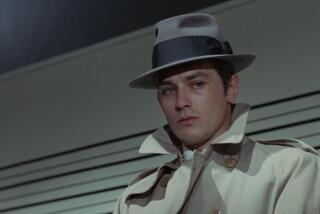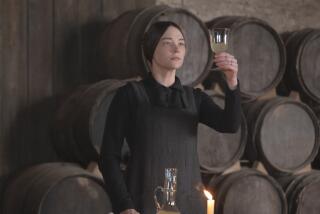Review: The biopic ‘Rodin’ about the famous French sculptor lacks shape and drama
- Share via
In the years leading up to the centenary of sculptor Auguste Rodin’s death, veteran French filmmaker Jacques Doillon (“Ponette”) was approached to work on a documentary project about the man behind such masterpieces as “The Age of Bronze,” “The Thinker” and “The Kiss.” Instead, Doillon made a mid-to-late-career-spanning biopic, “Rodin,” starring Vincent Lindon, that makes one long for the informational fluidity of a nonfiction history lesson.
It’s a movie that already seems like a dust-gathered statue, rather than something vividly, imaginatively crafted to reflect the burning intensity of so passionate and forward-minded an artist.
The peculiar dilemma, therefore, of artist biographies continues, wherein the need to pay textbook-like homage to greatness ultimately ossifies the messy life screaming to have its complexities dramatically explored: the egotist with a tender, awkward side; the tradition-challenging provocateur misunderstood in his time; and the voracious lover juggling two women.
Doillon’s venerating approach and reluctance to push things beyond a rote period handsomeness (courtesy of cinematographer Christophe Beaucarne), makes for a regrettably dull stroll through a big existence. This despite a fizzy charisma that occasionally animates heavy-eyed Lindon’s scenes with Izïa Higelin as Camille Claudel – a turbulent coupling already heaved into lusty life on-screen by Isabelle Adjani and Gerard Depardieu in the 1988 corker “Camille Claudel.”
Doillon’s starting point is 1880, when the 40-year-old Rodin has earned a rare state commission -- to create the Dante-inspired “The Gates of Hell” -- and is already deep into his stimulating affair with pupil/assistant Claudel, who longs for her own acceptance as a sculptor but clearly enjoys the frisky intellectual and sexual interplay with her mentor. Rodin, meanwhile, behaves like an underappreciated outsider, even as he lines up gigs memorializing storied figures such as Victor Hugo and Honoré de Balzac.
Fired by the expressiveness of the human form, Rodin preferred clay above all other materials (gold, stone, wood) for its in-the-moment malleability. And Lindon exhibits an authentic physicality bounding around as he takes in angles, gives orders to writhing nude models, and thumbs changes to his beloved clay.
But these mildly fascinating working-genius moments never really mesh with the zipless, scattershot scenes of Rodin and Claudel circling each other – flirtation has never seemed so pretentious – nor with outside-the-studio moments conversing with other names of the day (Cezanne, Monet, Rilke), or placating his long-suffering companion, Rose (Séverine Caneele), the mother of his child.
Doillon assembles his dreary pieces in a way that feels like a scrolled Wikipedia page, flitting from the bit where you learn he’s inspired by trees and clouds, to the section when he figures out what’s missing with the Balzac sculpture (an overcoat!), to the inevitably contentious break with the troubled (and who can blame her?) Claudel. When a sequence fades to black, one imagines the camera is simply nodding off at the lack of filmmaking on display.
Lindon seems suitably cast, exuding the right kind of bearish fortitude, but is saddled with labored dialogue. Hampered by Doillon’s haphazard time-hopping, a full performance eludes him. Higelin, meanwhile, wisely avoids proto-madness play-acting – Claudel’s life has all too often been defined by her later, institutionalized years -- but by a certain point this “Rodin” dumps its Claudel as brusquely as the artist did.
A bar for this type of picture was set four years ago with Mike Leigh’s masterful “Mr. Turner,” which breathed grunting life -- but also sublimely enlightening insight -- into an unlikely conduit of painterly beauty. Doillon’s “Rodin,” on the other hand, never connects all the disparate elements of inspiration, turmoil and perseverance in its game-changing subject. It hits benchmarks, ploddingly, perhaps assuming the reverence you bring will be the finishing veneer. But where Rodin made inanimate pieces multi-dimensional, “Rodin” remains a stultifying block.
-------------
‘Rodin’
In French with English subtitles
Not rated
Running time: 1 hour, 59 minutes
Playing: Laemmle Royal, West L.A.
See the most-read stories in Entertainment this hour »
Movie Trailers
More to Read
Only good movies
Get the Indie Focus newsletter, Mark Olsen's weekly guide to the world of cinema.
You may occasionally receive promotional content from the Los Angeles Times.










